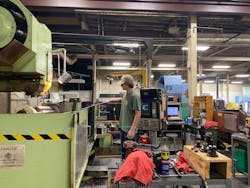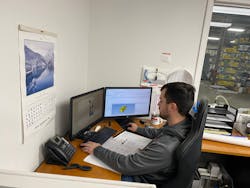Apprenticeship program helps Bay Plastics Machinery build for the future
Read more on the labor crunch: https://plasticsmachinerymanufacturing.com/21248002/.
By Karen Hanna
With roots dating back to 1961, Bay Plastics Machinery (BPM) has stood witness as the country completed the interstate highway system and entered the Space Age.
Long-term employees have provided continuity as the company transitioned from its early days as JETRO Inc., as company pioneer Tony Forgash Jr. tinkered on pelletizer designs, through the company's official establishment as BPM in 1997. A handful of workers have been around since the 1970s.
As long-time employees enter retirement age and bid their adieus, the company is again turning to innovation — with an in-house apprenticeship program it’s developing to build its future workforce.
“We've lost probably four or five [employees] over the last five years that were in that same group of people,” said Jim Forgash, VP of sales, a member of the third generation of his family to lead the pelletizer manufacturer. “We are losing a generation, and we're slowly backfilling that. You just have to find the right people.”
Companies that find promising workers should strive to keep them, Forgash said. That’s why BPM currently is covering the cost of the college education of an engineering apprentice, while practicing patience as it pays both him and another apprentice to learn new skills on the job.
Seventeen-year-old Wyatt Bossbach is one of the two young employees that BPM believes has the right stuff. He started off sweeping the floors, but when he expressed interest in everything else going on around him, company leaders realized he and BPM might have a future together.
Now, he’s working 20 hours a week at the plant.
“I would always ask [my co-worker], ‘Is there anything else I can do? Do you need help? How do you do this? Oh, why does this work this way?’ So, Iwas kind of asking questions and watching just to see how to do most of the stuff,” said Bossbach, who’s now balancing the demands of an apprenticeship at BPM with the last of his classes at a vocational school, where he’s a senior. A high school wrestler, he’s also finishing up an Eagle Scout project as a member of the Boy Scouts.
At BPM, he’s gotten to try out grinders, lathes and CNC machines. His first chance to work a five-axis machining center particularly stands out.
“I never had any experience with that. And it's pretty cool because when I first saw, I was like, ‘Whoa, this is so hard.’ And now, learning it, I'm OK, I'm getting it. It's not that hard if you just pay attention,” Bossbach said.
College student Kevin Reminder, 24, has worked for BPM over the last three summers and two school years. He put in 40 to 50 hours a week at BPM this summer, and now arranges his schedule around classes at Saginaw Valley State University, where he’s in his fifth year as a mechanical engineering major; he expects to graduate at the end of 2022.
He said his experience has given him insight into how design decisions are made, as well as the day-to-day workings of an engineering team. While he interned previously at a big firm in the Seattle area, he prefers life at BPM, which employs about 50 people, because he’s able to do more and gets to know his colleagues better.
“School doesn't teach you all the behind the … scenes, and why things are done the way they are,” he said. “Just the life knowledge that you get with interacting with people and learning what other people do that interact with your job and how they kind of mesh together has been really helpful, and I don't think I'd get that from school.”
BPM’s employees have embraced the apprentices, said Forgash, who quipped that relationships at a manufacturing facility can be “ruthless to the core.”
“Everyone,” he said, “gets teased equally. They definitely make sure that they're going to fit into the mentality, that they're going to fit into the family.”
While many things have changed, Forgash said, the company remains true to its roots, and the ideals established by his grandfather, JETRO founder Tony Forgash Sr., and father, Tony Forgash Jr., who established BPM. By doing right by its employees, the company has largely avoided the workforce issues so many employers currently are experiencing, Jim Forgash said.
“A lot of people are complaining, in regards to the labor shortage and such, [but] we took a different approach. We never laid anybody off during COVID,” he said. “So, during the whole shutdown, we sent everyone home, but we kept them employed, kept them with their full salaries coming, kept them with their insurance coming, so we never really put them out on the street to try and find something else or take a different approach. So, when we brought everyone back in, it was business as usual.”
At a time when ambitious students like Bossbach are encouraged to go to college, Forgash said he’s realizing the need for companies to grow their own workforce. His grandfather would have understood.
In a town of only about 33,000 people, he recognizes BPM has to be proactive in identifying local talent.
“This is kind of a concept that you bring in intelligent individuals, and we're looking for certain traits, like we need a mechanical-minded young man, working on cars and doing that type of stuff. With us being a manufacturer, a custom manufacturer, we kind of need that creative individual, so, when you see someone like that, that has made a decision that, ‘I don't want to go to college. College is not for me. I want to work with my hands. I don't need to be a millionaire. I want to be comfortable.’ You know, that's a good life choice,” Forgash said. “When you find an individual like that, you grow them.”
For a company that designs and makes all its own products in-house, the learning curve for any new employee can be long. The apprenticeships ensure the next generation will learn exactly what BPM needs, Forgash said.
When Bossbach graduates from high school and Reminder from university, they’ll both have full-time jobs at BPM.
Forgash expressed confidence that both Bossbach and Reminder will validate the company’s investment in them in the years to come. Reminder will be a key member of the engineering team, while Bossbach’s career as a machinist will take him from machining station to station and, maybe — eventually — around the world, performing service calls.
Putting trust in employees and taking care of them might be an old-fashioned approach, but it’s one Forgash believes will continue to pay off for BPM.
“It seemed to work for my grandpa; it seemed to work for my dad. So, the world's changing but something's got to stay the same, right? Take care of people, they’ll take care of you,” Forgash said.
Karen Hanna, associate editor
Karen Hanna | Senior Staff Reporter
Senior Staff Reporter Karen Hanna covers injection molding, molds and tooling, processors, workforce and other topics, and writes features including In Other Words and Problem Solved for Plastics Machinery & Manufacturing, Plastics Recycling and The Journal of Blow Molding. She has more than 15 years of experience in daily and magazine journalism.







